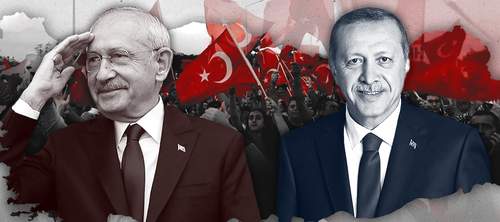
The political landscape in Turkiye has become increasingly convoluted after the May 14 presidential and parliamentary elections left the Turkish presidency up for grabs – with a critical, second round of polls to be held on Sunday.
As the main candidates who failed to secure the presidency in the first round prepare for the May 28 election, Turkiye’s patchwork system of political alliances has become more intricate, marked by polarizing debates on issues such as secularism, nationalism, Syrian refugees, and the Kurdish issue. In the very year that Turkiye celebrates the Republic’s 100th anniversary, the country’s political atmosphere has grown more uncertain than ever.
The official results of the first round of the presidential election saw incumbent Recep Tayyip Erdogan, the candidate of the People’s Alliance, obtain 49.5 per cent of the vote, while main opponent Kemal Kilicdaroglu, the candidate of the National Alliance, received 44.8 per cent – both remaining under the 50+ per cent threshold required for an outright win.
Muharrem Ince, who withdrew from the race at the last minute, secured 0.43 per cent of the vote, and Sinan Ogan, the candidate of the secular nationalist ATA Alliance, received 5.17 per cent. The second round between Erdogan and Kilicdaroglu has essentially transformed the election into a referendum on the former’s 21-year rule. The public’s sentiment and perception have therefore become crucial in this contest.
Despite the parliamentary election’s official results being due on May 19, the Supreme Election Board (YSK) has not yet released them, leading to some frantic domestic speculation on the reasons for this. Some observers have raised concerns about the possibility of fraudulent voters, as the number of voters is reportedly double the population growth rate. In normal circumstances, parliament should convene on the third day after the official results are published, and elected MPs should be sworn in.
However, Erdogan is purportedly stalling the swearing-in procedure because members of his alliance, the radical Islamist Kurdish movement HUDA PAR, refuse to utter the phrase “Turkish nation” during the ceremonial oath. This leaves Erdogan keen to defer the ceremony – and this drama – until after the May 28 presidential election.
In the lead-up to Sunday’s polls, the main topics dominating Turkiye’s political discourse are distrust in the fairness of the election, Turkish citizenships granted to Gulf Cooperation Council (GCC) nationals in exchange for top-dollar real estate purchases, and the wildly disparate numbers of refugees currently residing in the country (the government says less than 4 million; the opposition claims 13 million).
These highly polarizing issues have triggered several realignments within the two main alliances contesting the presidency. Since the country’s 2017 referendum, in which parliamentary democracy was replaced by a Turkish-style presidential system that recognizes unsealed ballots as valid, electoral irregularities have become a recurring concern. And so the opposition is understandably apprehensive about potential “vote theft” and the security of ballots.
